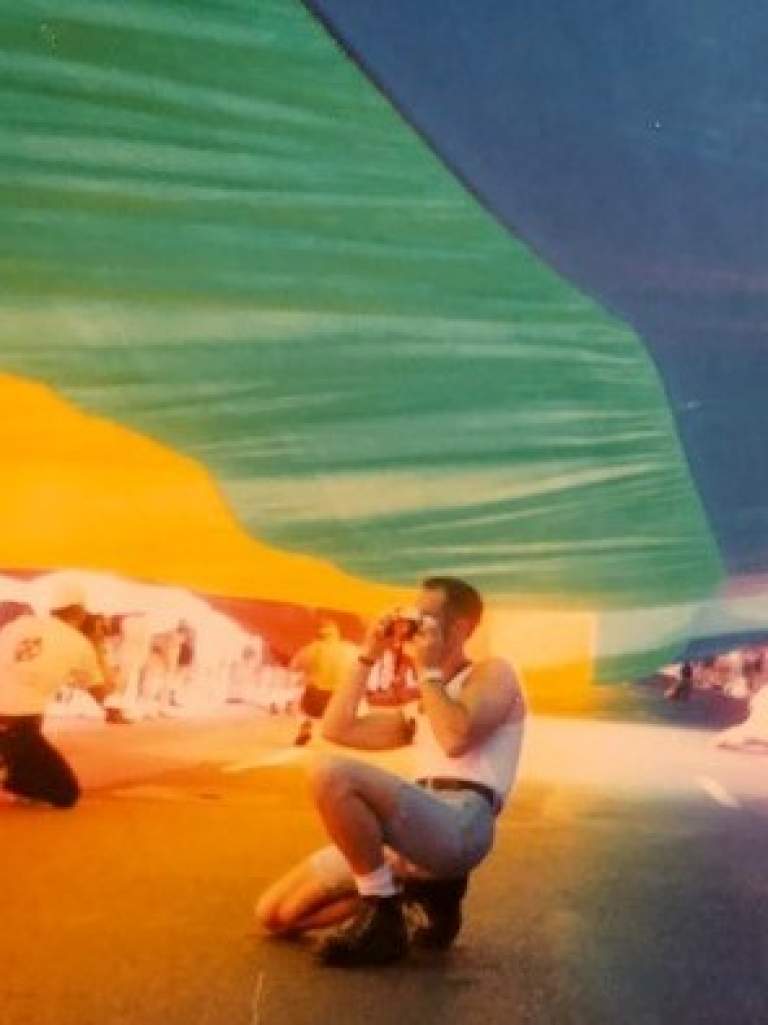
Justice & Opportunity
YOUTHFUL REFLECTIONS & PHILOSOPHIES OF A MIDDLE-AGED GAY WHITE MALE
Published June 29, 2020
By: Todd Geise
It’s June and it’s Gay Pride Month. I remember the first time I celebrated in earnest, traveling in 1994 with a group of older friends to New York City to mark the 25th Anniversary of the Stonewall Uprising and the death of gay entertainment icon, Judy Garland. I remember it being a surreal experience for me, not quite 24 years old and the first time back to New York since I traveled there for a band competition while attending a mostly rural high school in the Finger Lakes Region of the state.
There are two highlights I remember from that high school trip. The first is that we stayed at the Milton Plaza Hotel and I recall not moving fast enough through the revolving doors and some woman screaming at me to “get the f--- out of the way,” as only a New Yorker can do. The second is my first Broadway show, A Chorus Line, at the Shubert Theatre – last row balcony, but amazing, nonetheless. Theaters in New York are not nearly as large as Shea’s Buffalo, so still a great seat. But I digress as there is a third misunderstood memory that involves knowing I was different and very uncomfortable and scared around most males as a result. I realized much later in life that it was a discomfort around most straight males. As a result, I became independent, a loner and an observer, and often drawn to fantasy worlds in terms of movies and literature. These are characteristics that describe me to this day.
But my first Pride March in 1994 truly helped push me to be who I am and who I am proud to be. This opening of true self-acceptance began a year earlier when I was a volunteer for Gay & Lesbian Youth Services and chaperoned a trip to the 1993 Gay March on Washington. It was on that trip that I met my partner of now 27 years, Mark. It was his friends who were the older friends on the New York trip a year later, and it was that combination of back-to-back marches and group of people that gave me the confidence to live a life as an openly gay male.
It was also that combination that helped instruct me about the gay rights movement and the role of the Stonewall Inn where the movement began in 1969. I visited the Stonewall Inn in 1994 and it was powerful. Compared to today, by the time I was coming of age as a gay man as I described, you could ‘sort of’ be out of the closet, but it came with a lot of risks, some of which still exist in various passive-aggressive forms.
Back then, you could expect family push-back and potentially being disowned. Protections for gay people were relatively non-existent. Gay bashing was common and always a fear. Name calling and harassment was par for the course. And, you certainly never expected to be able to be legally married.
Even with all of that in 1994, you could still ‘sort of’ be out of the closet and what I realized was that it was due to progress of the courageous individuals and groups from the previous twenty-five years, beginning with the Stonewall Riots. What I also realized is that it was my generation, the next generation post-Stonewall that must continue to push the envelope, which we did.
We GEN X’ers, with our independence and our stubbornness helped pave the way for the next generations, building on the generation before. We more strongly became open in the workplace, openly purchased homes as couples, steadily came out in the entertainment industry, and have become proud politicians and business leaders. All lending voice and action to the movement. Millennials, for example, have grown up in a different world and it is fascinating to me that their majority really does not seem to care about a person’s sexuality.
When asked to write this reflection, I admit that the fears and anxieties of my youth came to the surface. As an employee of an organization that advances racial, economic, and ecological justice, however, I cannot help but also reflect on the challenges of so many other communities. Although LGBTQ people did not magically appear in 1969 and they have been part of the human experience since the beginning of human time, the movement progressed rapidly compared to other movements carrying even greater fears and anxieties.
So, I conclude with a philosophical question to the reader. We all have our stories. We all have our successes and failures. We all have our fears and anxieties. But, how long will it be before we all have a shared pride to celebrate for simply being a human being regardless of gender, of sexuality, of race, and of ethnicity?